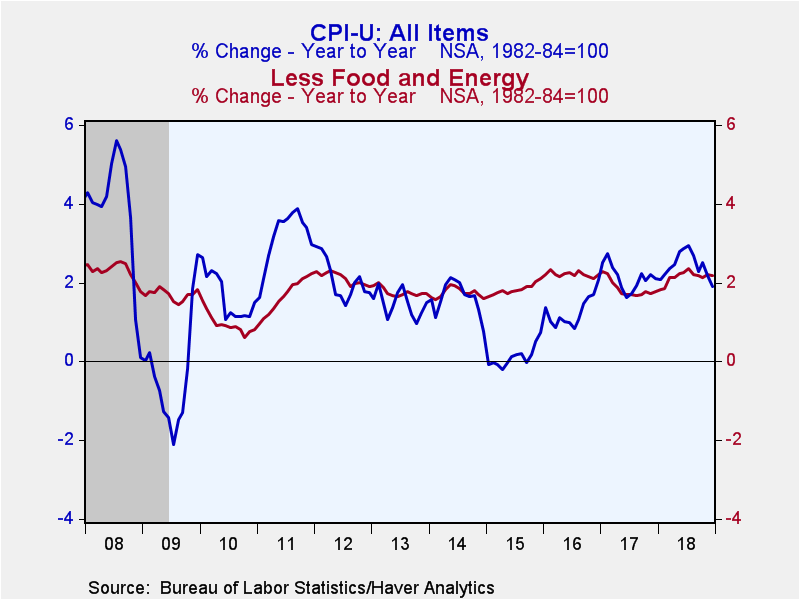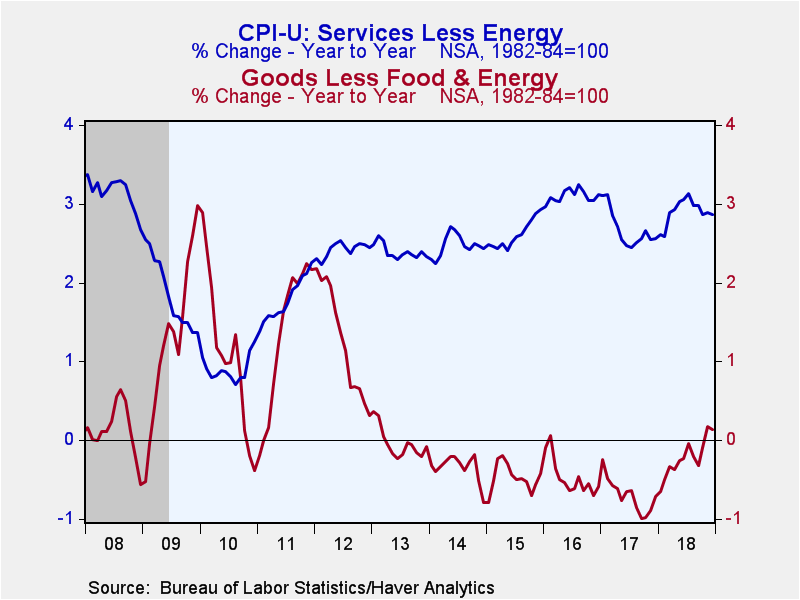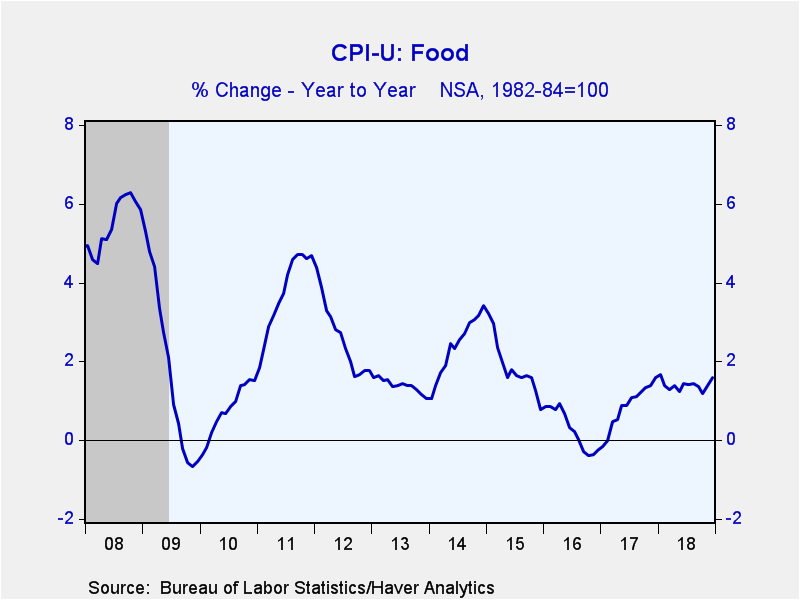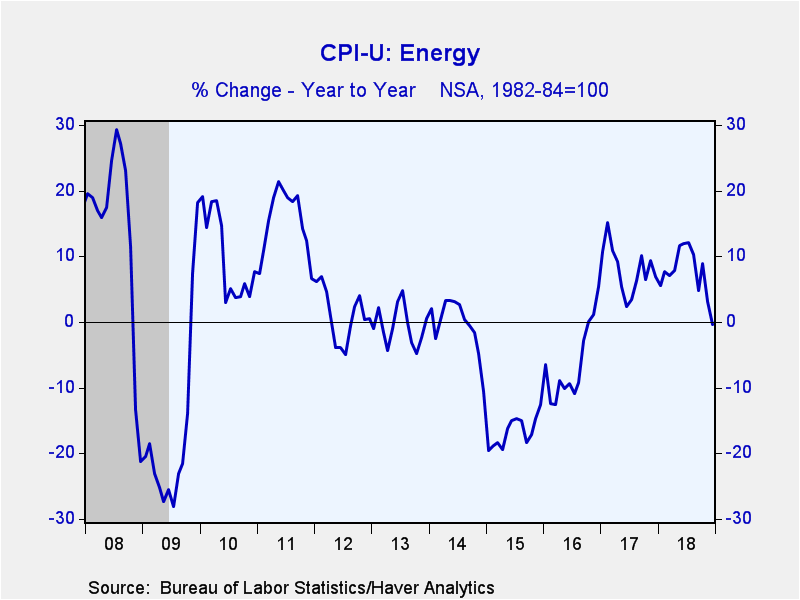 Global| Jan 11 2019
Global| Jan 11 2019U.S. CPI Eases As Expected; Core CPI Increases Steadily
by:Tom Moeller
|in:Economy in Brief
Summary
Prices remained under control during 2018. The Consumer Price Index slipped 0.1% in December (+1.9% y/y) following stability in November. It was the first decline in nine months and it matched expectations in the Action Economics [...]
Prices remained under control during 2018. The Consumer Price Index slipped 0.1% in December (+1.9% y/y) following stability in November. It was the first decline in nine months and it matched expectations in the Action Economics Forecast Survey. The CPI excluding food & energy improved an expected 0.2% (2.2% y/y) for the third straight month.
The rise in the "core" CPI reflected a 0.3% increase in services prices which was the largest monthly gain since July. The 2.9% y/y rise moderated, however, from its 3.1% peak this past June. Medical care services prices rose a steady 0.4% m/m, but the y/y gain accelerated to 2.6%. Recreation services costs increased 0.3% (2.3% y/y) after a 0.5% increase. Shelter also costs gained a steady 0.3% (3.2% y/y) as the owners equivalent of primary residences rose 0.2% and a steady 3.2% y/y. Primary shelter rents increased a lessened 0.2% (3.5% y/y). The cost of education & communication ticked 0.1% higher (0.5% y/y) reflecting a 0.2% gain in the cost of college tuition (2.8% y/y). Working lower by 0.2% (+2.8 y/y) were transportation services costs, reflecting a 0.9% drop (-1.7 y/y) in public transportation prices, which was the third consecutive monthly decline.
Goods prices excluding food & energy rose 0.1%, the weakest gain in three months. The 0.1% y/y rise compared positively, however, to price deflation from 2013 until October, 2018. The gain was dominated by a 4.0% strengthening (2.5% y/y) of sporting goods prices which followed declines during most of the economic expansion. Recreation product prices also strengthened 1.3% (1.0% y/y) after several years of decline. Education communication product prices rose 0.7% (-3.3% y/y) after two months of weakness. New vehicle prices held steady (-0.3% y/y) following much larger y/y price declines early last year. Appliance prices eased 0.3% but the y/y price change of +4.7% compared to price deflation during the prior five years. Household furnishings slipped 0.1%, but y/y growth accelerated to 0.9% after sharp price deflation from 2012 to mid-2018. Clothing prices held steady m/m after having fallen moderately since 2015. Counteracting these favorable comparisons was a 0.5% y/y decline in medical care product prices following strong gains during the prior four years.
Food prices rose 0.4% (1.6% y/y) last month as fruit & vegetable costs jumped 1.7% (1.6% y/y). Cereal & bakery product prices rose 0.4% and by an accelerated 1.7% y/y. Meat, poultry and fish prices also rose 0.4% (-0.3% y/y) and egg prices fell 2.9% (-2.2% y/y). Dairy product prices rose 0.3% and continued to be roughly steady as they had been through 2017. Nonalcoholic beverage prices increased 0.3% and by an accelerated 1.4% y/y.
A 3.5% decline in energy product prices was led by an 11.4% drop (+1.9% y/y) in fuel oil prices while the cost of gasoline declined 7.5% (-2.1% y/y). A 5.6% jump in natural gas prices (2.3% y/y) offset these declines while electricity costs rose 0.7% and by an accelerated 1.1% y/y.
The decline in consumer prices was accompanied by a 0.5% increase in real average hourly earnings (1.1% y/y).
The consumer price data can be found in Haver's USECON database with additional detail in CPIDATA. The Action Economics survey figure is in the AS1REPNA database.
| Consumer Price Index, All Urban Consumers (% chg) | Dec | Nov | Oct | Dec Y/Y | 2018 | 2017 | 2016 |
|---|---|---|---|---|---|---|---|
| Total | -0.1 | 0.0 | 0.3 | 1.9 | 2.4 | 2.1 | 1.3 |
| Total less Food & Energy | 0.2 | 0.2 | 0.2 | 2.2 | 2.1 | 1.8 | 2.2 |
| Goods less Food & Energy | 0.1 | 0.2 | 0.3 | 0.1 | -0.2 | -0.7 | -0.5 |
| Services less Energy | 0.3 | 0.2 | 0.2 | 2.9 | 2.9 | 2.7 | 3.1 |
| Food | 0.4 | 0.2 | -0.1 | 1.6 | 1.4 | 0.9 | 0.3 |
| Energy | -3.5 | -2.2 | 2.4 | -0.3 | 7.5 | 7.9 | -6.6 |
Tom Moeller
AuthorMore in Author Profile »Prior to joining Haver Analytics in 2000, Mr. Moeller worked as the Economist at Chancellor Capital Management from 1985 to 1999. There, he developed comprehensive economic forecasts and interpreted economic data for equity and fixed income portfolio managers. Also at Chancellor, Mr. Moeller worked as an equity analyst and was responsible for researching and rating companies in the economically sensitive automobile and housing industries for investment in Chancellor’s equity portfolio. Prior to joining Chancellor, Mr. Moeller was an Economist at Citibank from 1979 to 1984. He also analyzed pricing behavior in the metals industry for the Council on Wage and Price Stability in Washington, D.C. In 1999, Mr. Moeller received the award for most accurate forecast from the Forecasters' Club of New York. From 1990 to 1992 he was President of the New York Association for Business Economists. Mr. Moeller earned an M.B.A. in Finance from Fordham University, where he graduated in 1987. He holds a Bachelor of Arts in Economics from George Washington University.
More Economy in Brief
 Global| Feb 05 2026
Global| Feb 05 2026Charts of the Week: Balanced Policy, Resilient Data and AI Narratives
by:Andrew Cates










